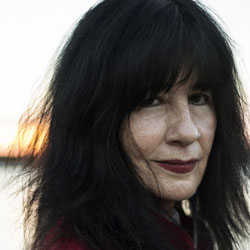I must keep from breaking into the story by force,
If I do I will find a war club in my hand
And the smoke of grief staggering toward the sun,
Your nation dead beside you.
I keep walking away though it has been an eternity
And from each drop of blood
Spring up sons and daughters, trees
A mountain of sorrows, of songs.
I tell you this from the dusk of a small city in the north
Not far from the birthplace of cars and industry.
Geese are returning to mate and crocuses have
Broken through the frozen earth.
Soon they will come for me and I will make my stand
Before the jury of destiny. Yes, I will answer in the clatter
Of the new world, I have broken my addiction to war
And desire.
I have buried the dead, and made songs of the blood,
The marrow.
Notes on the Poem
We know another selection from Joy Harjo's 2016 Griffin Poetry Prize shortlisted collection Conflict Resolution for Holy Beings will bolster our spirits, as did the rousing "Sunrise Healing Song". "Equinox" is just what we're looking for ... What elements on the page or screen hint at how this poem is so effortlessly uplifting? For one, the poem's imagery moves from war and death into peace, reconciliation, birth and rebirth with irresistible momentum, right from the narrator's first energetic pronouncement: "I must keep from breaking into the story by force" through the transformation from weapons and smoke and bloodshed to the appearance of new sons and daughters, trees and songs, although much is intermingled with sorrow. But as "Geese are returning to mate and crocuses have Broken through the frozen earth." the sense of motion and myriad of activities build a growing feeling of optimism. The poem is also framed by changing uses of the verb "to break", from "breaking into the story" to "hav[ing] broken my addiction", and by references to blood that move from death to birth to nourishment and fertility. Harjo embodies this positive moving forward in her recent rendition of this poem at the 2016 Griffin Poetry Prize shortlist readings. (In the video below the poem, her introduction is at the 26:45 minute mark, and she launches into the poem around 28:05.) She chants/sings the poem, in a voice that is comforting, steadfast and gently hopeful.
